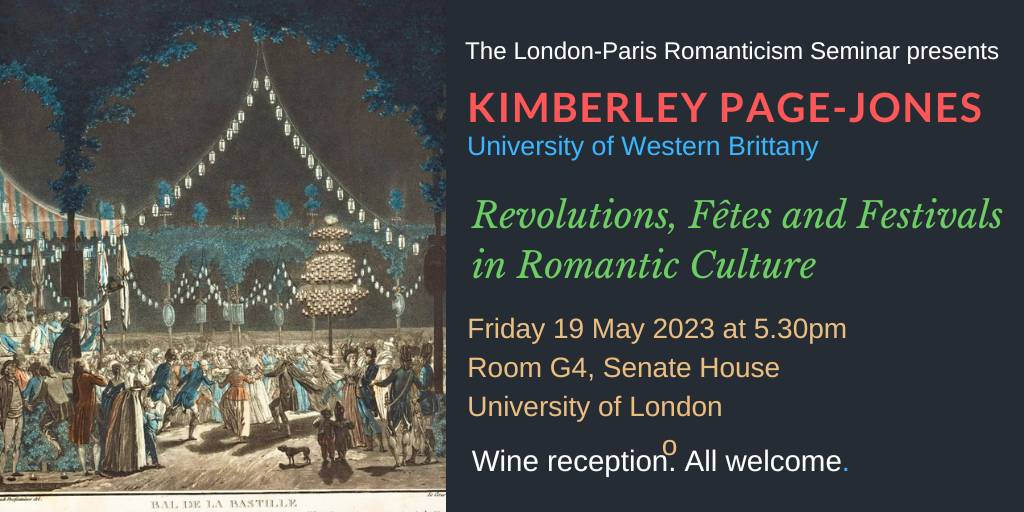
The final meeting of the 2022-23 series of the London-Paris Romanticism Seminar will take place on Friday 19 May 2023 in Room G4, Senate House, University of London, starting at 5.30pm. As our guest speaker, we are delighted to welcome Dr Kimberley Page-Jones of the University of Western Brittany, France, who will present a paper entitled ‘Donnez les spectateurs en spectacle: rendez les acteurs eux-mêmes’: Revolutions, Fêtes and Festivals in Romantic Culture. This will be followed by a discussion and a wine reception, to which all are invited. The seminar will be chaired by Luisa Calè (Birkbeck, University of London).
The event is free and open to everyone, including postgraduates and members of the public. No booking is required.
Kimberley Page-Jones is senior lecturer in British Studies at the University of Western Brittany in France. Her research initially focused on the practice of notebook writing during the Romantic era (Energie et mélancolie. Les entrelacs de l’écriture dans les Notebooks de S.T. Coleridge (2018)). She has coordinated the DIGITENS project on British, European and Colonial sociabilities in the long eighteenth century (2019-2022), and is the managing editor of the digital encyclopedia DIGIT.EN.S. She has co-edited La sociabilité en France et en Grande-Bretagne au Siècle des Lumières. L’insociable sociabilité: résistances et résilience (2017) with Katherine Aske, and La fabrique des sociabilités en Europe et dans les colonies. Espaces et identités (XVIIIe-XIXe siècles) (2023) with Valérie Capdeville. Her research focuses at present on Romantic sociable practices, their political significance and aesthetic representation in literature.
Regarding the topic of her paper, Kimberley writes:
“Civil ceremonies and national feasts were key features of the French revolutionaries’ plan of public instruction. Influenced by Rousseau, ideologues like Cabanis, Boissy D’Anglas and La Révellière-Lépeaux devised aesthetic strategies to marshal patriotic sentiments among crowds of people assembled in the open air. An enactment of Rousseau’s fête primitive, the revolutionary fête struck the imagination of British travellers to France in the early 1790s. However, if Helen Maria Williams wrote her first Letters Written in France (1790) with the codes of French revolutionary sensibility, British travellers to Jacobin France chronicled festive violence rather than collective effervescence and, as such, dissociated festive rhetoric from the ideal of fraternity it was meant to embody. After the September massacres in 1792, what British writers, whether loyalist or republican, saw in the French fête was the toxic influence of festive language and artifice, and this led them to redraw the contours of British public affections in contradistinction to French ‘giddy patriotism’. And yet, although the French festival was often reduced to a mere sensationalist spectacle, there was a fascination with its aesthetic devices and emotional effects on participants which, this paper will argue, had a deep and enduring influence on Romantic culture.”